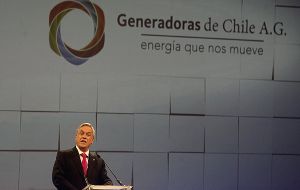MercoPress. South Atlantic News Agency
Chile with 50% hydro power by 2034, but serious energy shortages in 2015
 President Piñera addressing the electricity sector leaders (Photo: emol.com)
President Piñera addressing the electricity sector leaders (Photo: emol.com) President Sebastián Piñera announced a 20-year plan for Chile’s energy needs at the annual energy dinner in front of the country’s top executives in the electricity sector. The president said the plan aims to create “a cleaner energy, that is safer, more economical and that agrees with the energy requirements of our country.”
The eight-point plan focused on making Chile’s energy production more efficient and improving sources of renewable energy. The measure includes implementation of energy savings of up to 12%, equivalent to about 1,100 megawatts of electricity by 2020.
Piñera warned executives that Chile would face an energy crisis during his administration and beginning in 2015 the country could face serious problems. The demand for energy in the country is estimated to grow an average of 6 or 7% annually until 2020.
Among other measures Piñera planned to combat these problems by increasing the percentage of Chile’s energy that is derived from hydroelectric power from 34% to 45 or 50% in the next two decades.
Two proposed energy projects by HidroAysén and Xstrata are already causing controversy in the Aysén Region of Patagonia.
Piñera promised that these initiatives would not “exploit the riches of Patagonia,” but many local communities are dissatisfied with the lack of transparency surrounding the energy deals and potential damage the projects could cause to the area.
Despite the announcement of a much-anticipated electric project that will connect electricity generated in the South to more populated and industrial areas in the North, Piñera assured that no more than 0.2%, or 77 square miles, of the total Aysén region would be affected.
Piñera also promised that any future plans would be subjected to stringent environmental standards.
“We need to substantially improve our capacity and technology with transmission lines in order to ensure supply and easy access to all energy generators,” Piñera said, “as well as to increase competition among industry players.”
The president also declared that Chile was working toward greater regional integration and that talks with Colombia, Peru and Argentina were a priority for the region’s future energy status.
Non-Conventional Renewable Energies (NCRE) were also discussed at the dinner with Piñera downplaying the importance of thermoelectricity to instead focus on the government’s pledge of an 85 million dollars fund to promote renewable energy pilot projects with a range of subsidies and incentives.
Recognizing the importance of developing non-conventional energy sources, Piñera said that “because Chile was a poor country in the energies of the past, energies such as fossil fuels, gas, oil, and coal, it is a country immensely rich in the energies of the future.”
By Olivia Crellin – The Santiago Times




Top Comments
Disclaimer & comment rules-

-

-

Read all commentsChile must be autosufficient in energies, both conventional and renewable types, and never depend on bipolar or non friendly Gvt. from our neighbors, we have had already a very desastrous experience with the natural gas contracts signed with privates companies under a s state to state agreement to asure the flow through the pipelines but it was deleted and denied by the Argentine Gvt. whithout advise...with the Peruvians we can't sign any contract because they have sued us for borderline issues....and to reach Colombia, the only other reliable country in the region we must go through Peru, so impracticable also....
Jan 17th, 2012 - 02:18 am 0Better alone than bad accompanied......
It's good to see Chile doing something constructive for the environment and
Jan 17th, 2012 - 07:35 am 0to see this catch on in other counrtires in latin America.
A worthy long-term goal right enough, however there is still the problem of the short term.
Jan 17th, 2012 - 12:29 pm 0The problem with long-term planning is that you inevitably have to go through a number of short-terms to get there and given that democratic leaders have to answer to their electorates on a short-term basis, it makes long term capital-heavy projects like any form of power station (be it fossil fuel, nuclear or hydro) politically undesirable.
That is until the lights start going out, then with the power of hindsight it's very easy to be supportive of building new power stations.
Commenting for this story is now closed.
If you have a Facebook account, become a fan and comment on our Facebook Page!